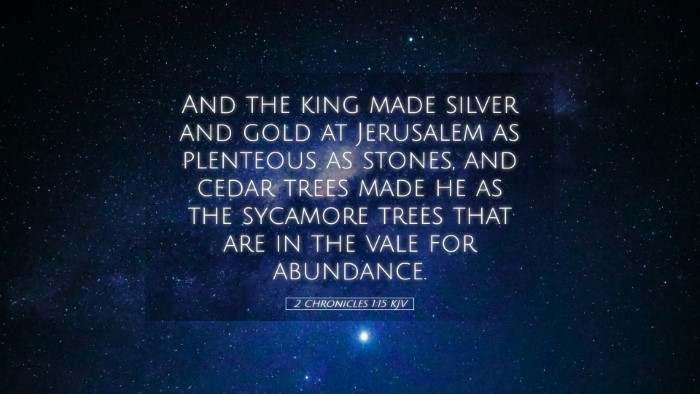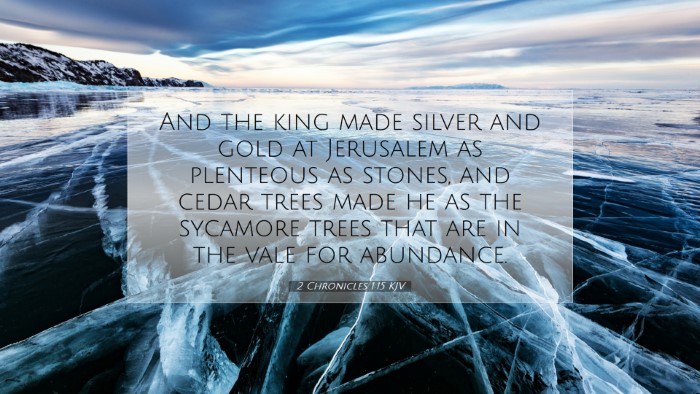Commentary on 2 Chronicles 1:15
Introduction
The verse 2 Chronicles 1:15 states: "And the king made silver and gold as plenteous in Jerusalem as stones, and cedar trees made he as the sycamore trees that are in the vale for abundance." This account, although brief, reveals profound theological and practical insights significant for pastors, scholars, and students of the Bible. This commentary will distill wisdom from esteemed public domain commentaries to elucidate the meaning and implications of this passage.
Contextual Background
The context of 2 Chronicles reveals its authorship attributed to Ezra and focuses on the reign of kings in Judah, particularly emphasizing the temple and worship. This chapter encapsulates the early years of Solomon’s reign after his request for wisdom, highlighting the prosperity and stability that followed. The abundance of silver, gold, and timber symbolizes not just wealth but also God's blessings on Solomon’s reign.
Theological Insights
-
Divine Provision:
Matthew Henry remarks on the extraordinary provisions made by God during Solomon’s reign. The mention of gold and silver being as abundant as stones illustrates not only Solomon's wealth but God's favor. This reflects the biblical principle of divine provision for those who seek God’s purpose and guidance. Solomon, having asked for wisdom, is rewarded with material riches, showcasing God's generosity.
-
Symbolism of Abundance:
Albert Barnes emphasizes that the abundance of resources symbolizes the blessings of a peaceful and prosperous kingdom under God’s guiding hand. Cedar is noted for its durability and quality, often used in temple construction, thus its abundance signifies the strength and beauty of God's house. As cedar trees are compared to sycamores, the comparison reflects a vast abundance, pointing to God's capability to provide abundantly for His people.
-
Wealth and its Purpose:
Adam Clarke discusses the implications of wealth in the life of a leader. He warns that while riches can denote success, their ultimate purpose is to glorify God. Solomon’s wealth was not only for personal enjoyment but was intended for the construction of the Temple, thus it underscores the necessity of channeling resources for God’s kingdom work.
Pastoral Applications
-
Leadership and Stewardship:
Leaders, much like Solomon, are called to exercise stewardship in their roles. The abundance in this verse challenges pastors to consider how they manage the resources entrusted to them by God. It prompts a reflection on whether they use their influence and resources for the advancement of God's kingdom or for personal gain.
-
The Call to Wisdom:
The request for wisdom at the beginning of Solomon's reign exemplifies the call for today's leaders. In an age of materialism, the message of seeking wisdom over riches remains pertinent. Pastors are encouraged to impart this wisdom to their congregations, aiming for spiritual richness over monetary wealth.
-
Expecting God’s Abundance:
This verse serves as a reminder of God’s ability to provide abundantly to those aligned with His will. Pastors should inspire hope within their congregations, encouraging them to trust in God’s provision, especially in times of need. This aligns with the New Testament promise of God providing for all needs (Philippians 4:19).
Scholarly Reflections
-
Cultural Context of Wealth:
Scholars note that in ancient Near Eastern cultures, the prosperity of a king was often directly linked to his power and favor from the gods. Solomon's wealth serves as a testimony of the God of Israel's supremacy. It opens discussions on the relationship between faith and economics within ecclesiology and soteriology.
-
Comparative Analysis:
Comparing the abundance described in this verse with contemporaneous accounts from other cultures provides a rich avenue for analysis. Scholars might explore how the biblical account contrarily offers a moral framework for wealth in contrast to the often self-centered pursuits observed in secular accounts of wealth.
-
Eschatological Considerations:
In echoing themes of abundance, scholars may also draw eschatological connections. The ultimate fulfillment of God's promise of abundance is found in Christ, which invites deeper reflection on how the physical and material blessings represented here point towards the spiritual wealth available in the Kingdom of God.
Conclusion
2 Chronicles 1:15 provides rich insights for contemporary readers, linking historical abundance with the theological principles of divine provision, purpose-driven wealth, and wise leadership. The reflections from respected biblical commentaries serve not only to enrich the understanding of the text but to inspire practical applications for leaders, scholars, and believers alike. As such, readers are challenged to continue seeking wisdom, viewing their resources through the lens of stewardship, and trusting in God’s abundant provisions.


